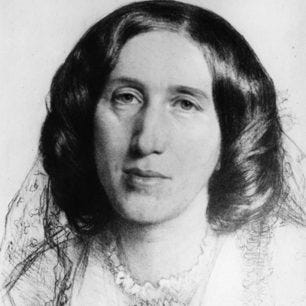The Bluestocking, vol 81: George Eliot looked like a horse
Happy Friday!
Apologies for the hiatus, which kicked off with me being in Dublin for the referendum (progress is still possible! Hurrah!) and took in a week's holiday, where I outperformed expectations by not cracking and doing any work until ... Thursday.
I get a lot of emails from younger women asking how I manage to fit so much stuff in, and I feel bad when I tell them that I do it by being terrible at saying No and sacrificing my evenings and weekends. I think they are probably hoping to hear about some amazing productivity trick that means I drink a pint of coffee and bosh everything off between 5 and 6am, leaving time for a nutritious wheatgrass shot for breakfast and 50 lengths of an Olympic-sized pool. (If you know about such a productivity trick, please get in touch.)
Anyway, this week, I've been writing about my former editor Paul Dacre, who is stepping back from the Daily Mail after 26 years.
Helen
PS. If by some mad chance you haven't heard enough from me recently, I'm doing an event at the Almeida on forgotten women writers on 25 June. Tickets £5 or free to under-25s.
My so-called millennial entitlement
On an episode of his podcast Revisionist History, Malcolm Gladwell argues that we should treat education as a weak-link network, where strengthening the weakest links has the most positive outcome for all. This is in contrast to a strong-link network, where a couple of superstars at the top carry the weaker players on the bottom. He illustrates this dynamic using soccer and basketball. An average soccer team with one star player is less likely to win a match than an above-average team with no star players — soccer is a weak-link sport. Conversely, an NBA team with a superstar or two fares better than a team on which all the players are equally, decently good — basketball is a strong-link sport.
This piece is a bit long, but it gets into the weird paradox of generational strife. Some things our parents would have considered unattainable luxuries (massive TVs, holidays, gadgets) are now everyday treats for under-35s. Things they would have considered essential prerequisites for a good standard of living (fixed hours in a job, a mortgage) are now unattainable for many.

George Eliot looked like a horse
Henry James characterized her as “magnificently ugly, deliciously hideous.” But James also noted an interesting phenomenon about Eliot’s supposed ugliness: when she began to converse, her expression was one of such tenderness and sympathy that it left her interlocutor with an abiding sense of beauty. “Behold me, literally in love with this great horse-faced bluestocking!” James wrote after his first encounter with her. Many others who met her made similar comments, including Lucy Clifford, a novelist, who said that Eliot did, indeed, look like a horse—“a strange variety of horse that was full of knowledge, and beauty of thought, and mysteries of which the human being had no conception.”
Didn't stop her putting it about a bit, though, and for that I salute her.
What it feels like to be cast as an ugly character
“I’m never going to be the prom king, I’m not going to be the quarterback of the football team, I’m the lovable loser,” actor Jesse Heiman tells me over the phone from his home in Studio City, LA.
“Maybe you get on the underground over there, or you get on the bus, and there’s some strange person who you wouldn’t want to talk to – I get to play that guy.”
Talking of which . . .
Vice: A Company Built on A Bluff
The company’s staff was meanwhile trying to figure out what exactly it meant to be a “360, Multi-Platform, Vertically Integrated, Global Media Brand” that still claimed a countercultural heritage. In 2014, the staff of Noisey published a satirical post — “The 123 Worst Musicians of All Time” — that seemed to fit squarely in the Vice tradition (“Jimi Hendrix: This guy could only play one instrument”). But the staff was chastised after the fact on the grounds that the post was “too mean,” and Smith told several members of the Noisey staff that if they ever pulled a stunt like that again, he would simply go buy Pitchfork. “We always say that post killed the ‘old Vice,’ ” says one staffer.
One of the pleasing/annoying things about being in journalism for more than a decade now is that I've lived long enough to see several outlets that claimed to have defied gravity come crashing back to earth.
Current mood: DOUBLE EAGLE
BONUS:
See you next time!

